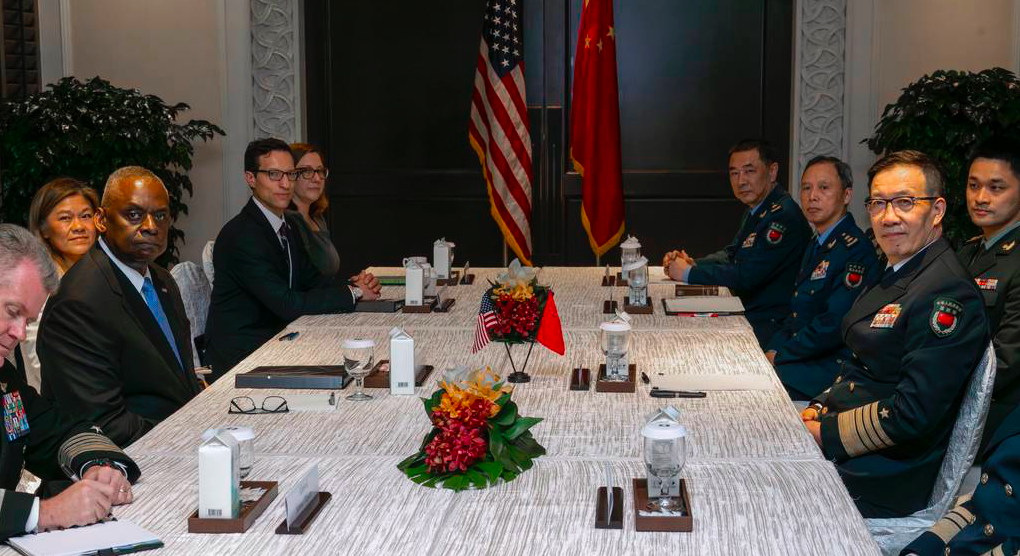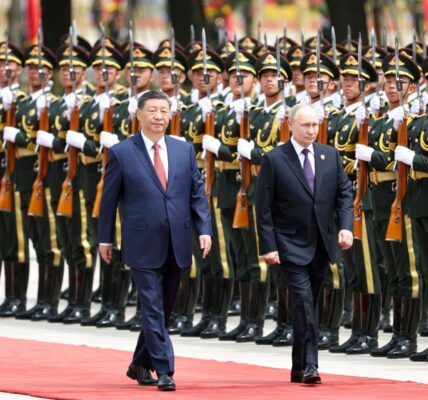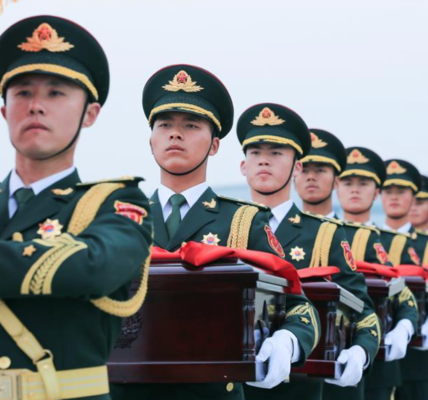
In a significant showdown marking the first face-to-face meeting between US and Chinese defence chiefs in two years, the hot-button issue of Taiwan took centre stage. Defence Secretary Lloyd Austin and China’s defence minister, Admiral Dong Jun, convened in Singapore on the sidelines of the Shangri-La Dialogue, Asia’s premier security summit.
During the 75-minute meeting, Secretary Austin voiced concern over recent intensified military activities by the People’s Liberation Army (PLA) around the Taiwan Strait following the inauguration of President Lai Ching-te.
Austin called China’s military exercises “provocative” and insisted that Beijing not use Taiwan’s “political transition… as a pretext for coercive measures”.
China’s Defence spokesman Wu Qian retaliated saying, “The Taiwan issue is purely China’s internal affairs, external forces have no right to interfere, and the United States’ actions seriously violate the one China principle”, alluding to Washington’s move to congratulate Lai and send a delegation to the ceremony.
Secretary Austin also reiterated the United States “will continue to fly, sail, and operate — safely and responsibly — wherever international law allows,” noting the importance of respect for high seas freedom of navigation, particularly in the South China Sea. Tensions however remained palpable as discussions extended to other flashpoints, including Russia’s ongoing war in Ukraine and the PRC’s role in supporting Russia’s defence industry.
Today’s meeting comes after Taiwan’s defence ministry reported a significant uptick in Chinese military activity around the island on Thursday, including the detection of 38 Chinese warplanes and 11 navy or coastguard vessels over a 24-hour time period. This escalation comes in the wake of massive military drills by Beijing, where Chinese warships and fighter jets encircled Taiwan, signalling a robust display of military capability.
These drills, conducted just three days after Taiwanese President Lai Ching-te took office, were seen by China as a direct response to Lai’s inauguration speech, which Beijing condemned as a “confession of independence.”
The exercises demonstrate China’s capability and readiness to undertake aggressive actions against Taiwan, with some strategic analysts warning that any invasion might be executed rapidly, potentially outpacing any allied response.
Potential ‘Lightning’ Strike Scenario
Dmitri Alperovitch, a US think-tank chief and author on geopolitics, argues that China’s opening moves in such a conflict would likely mirror Russia’s initial invasion tactics in Ukraine.
Alperovitch suggests that Beijing has been preparing for a similar “lightning” strike on Taiwan’s government and command network, aiming to neutralise the island’s defences quickly. Such a strategy could involve rapid airborne assaults to capture critical infrastructure before Taiwan and its allies have a chance to respond effectively.
Persistent Military Pressure
Beijing’s Taiwan Affairs Office (TAO) announced on Wednesday that further military exercises could follow last week’s “Joint Sword-2024A”. TAO spokeswoman Zhu Fenglian stated that the PLA’s actions would persist as long as there are independence provocations from Taiwan. Zhu criticised President Lai’s rhetoric as “extremely reckless,” warning that it risks triggering a war in the Taiwan Strait and endangering Taiwanese citizens.
“We will never tolerate, condone, or allow this, and we must counteract and punish this,” Zhu emphasised. “The greater the provocation, the stronger the countermeasure”.
Diplomatic and Strategic Implications
Taiwanese Foreign Minister Lin Chia-lung highlighted the all-encompassing nature of Chinese pressure, particularly its diplomatic efforts to exclude Taiwan from international organisations like the World Health Organisation.
Lin pointed out other aggressive actions by China, such as opening new air routes close to Taiwan-controlled islands and sending coast guard ships to Taiwan’s east coast. These moves are seen as attempts to create a “new normal” and gradually annex Taiwan.
Dr. Sari Arho Havrén, an associate fellow at RUSI, offered insights into China’s assertive posturing, surrounding its recent military drills near Taiwan. She remarked, “Beijing has clearly become even more aggressive than before, and we can expect these sort of drills to continue to coerce Taiwan but also others in the region”. The extensive nature of these exercises underscores Beijing’s preparedness to respond decisively to perceived provocations, such as President Lai’s inauguration speech.
Havrén emphasised that Beijing’s message isn’t solely directed at Taiwan but serves as a warning to foreign governments against meddling in what China deems its internal affairs. By flexing its military muscle, Beijing aims to deter external interference and consolidate its territorial claims, a strategy that has broader implications for regional stability.
As global leaders meet in Singapore, the spotlight remains firmly fixed on the delicate balance of power in the Asia-Pacific region.
While diplomatic overtures may temper immediate tensions, the underlying fault lines persist. As the US and China navigate their complex relationship, the Taiwan issue looms large, carrying profound implications for regional stability and global security.
The path ahead demands deft diplomacy, strategic foresight, and a commitment to constructive engagement to mitigate the risk of miscalculation and regional escalation.

















































































































































































